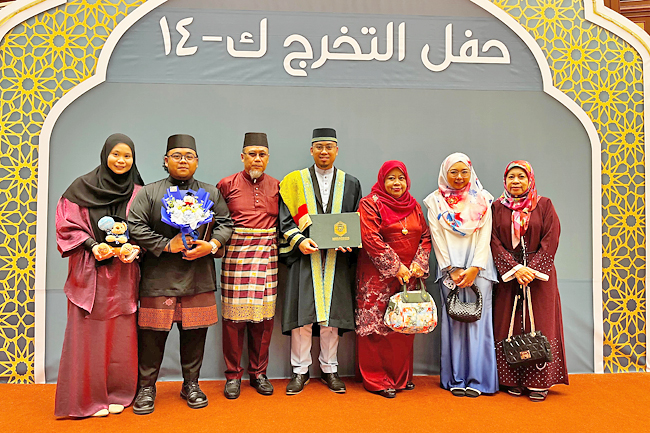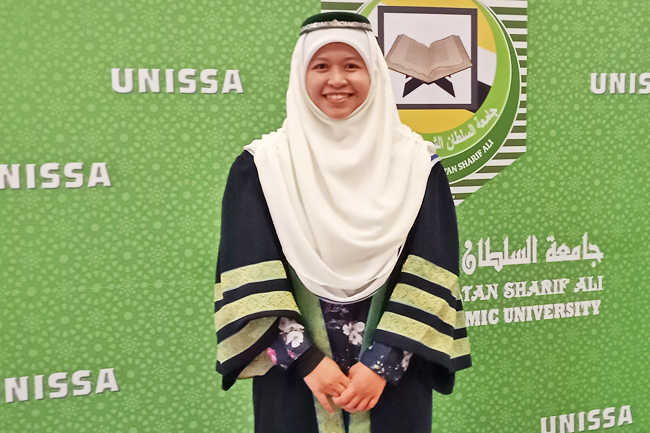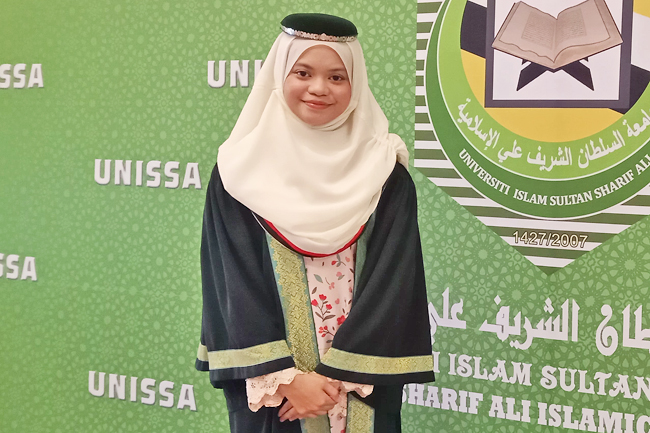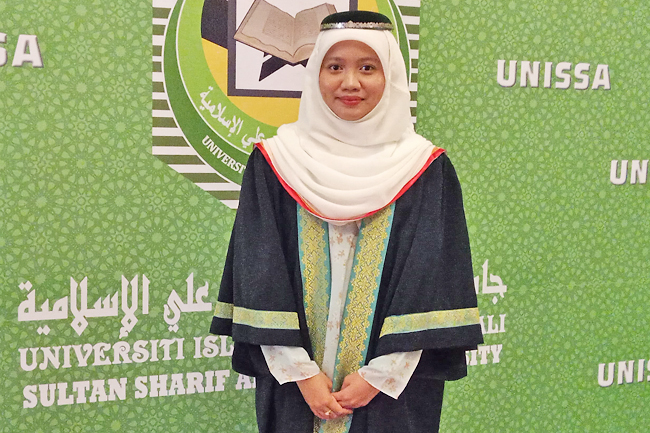As August concludes, convocation ceremonies begin for higher education graduates, marking their transition into the professional world or further academic pursuits.
The Bulletin spoke with recent graduates from the 14th Universiti Islam Sultan Sharif Ali (UNISSA) Hafl Al-Takharruj at International Convention Centre to gain insights into their next steps and future plans.
FILLING THE GAP
Take for instance PhD graduate in Islamic Media and Communication Technology under the Faculty of Islamic Technology, Dr Nurulhuda Asilah binti Haji Asli. While pursuing her PhD, Dr Nurulhuda took on the added responsibility of serving as a research assistant for two distinct research grants.
The first project spanned seven months during her second year, while the second remains ongoing.
Both projects, carried out under the Faculty of Islamic Technology at UNISSA, presented a unique challenge – balancing academic studies with research duties.
Yet, Dr Nurulhuda found that the alignment between her research and the assistantship made the workload manageable.
Despite the projects being in a different field, she valued the experience as it complemented her broader academic pursuits.




When asked why she chose Islamic technology for her PhD, Dr Nurulhuda highlighted the increasing significance of technology in modern life.
“Technology has become an integral part of our lives.
“As Muslims, it is crucial to stay abreast of modernisation without compromising our Islamic values. To ensure we are not led astray, we must engage with advanced technology rather than be left behind.”
She further stressed the need for more academic research at the intersection of Islam and applied technology.
“There is a noticeable gap in studies that merge Islam with advanced technology, and I believe it is vital to expand research in this interdisciplinary field.”
HALAL AS A CULTURAL CORNERSTONE
Meanwhile, Luqmanul Hakeem bin Haji Rozaini, a recent Master’s graduate in Halal Science with a specialisation in Halal Management, has his sights set on advancing Brunei Darussalam’s standing in the global halal industry.
Speaking passionately about his field of study, he revealed how halal management is not just about certification, but ensuring that industries such as food, cosmetics, pharmaceuticals, and logistics comply fully with Islamic principles.
“Halal management goes beyond labels and certificates. It’s about ensuring that the entire supply chain, from production to consumption, adheres to Islamic standards,” Luqmanul Hakeem said.
Luqmanul’s expertise ensures products and services meet halal criteria while upholding ethical and quality standards.
With the global halal market expanding, particularly in non-Muslim majority countries, his skills are crucial for building trust and bridging cultural divides.
Brunei benefits from his work in developing policies that maintain halal certification integrity, impacting not just food but also pharmaceuticals, finance, and tourism.
“Halal management is essential for upholding our cultural and religious integrity, ensuring public health and safety, and strengthening consumer confidence,” he said.
It also contributes to Brunei’s national identity and global competitiveness, making it a vital pillar of the country’s development.
The graduate also highlighted the varying levels of public awareness regarding halal management across different countries, emphasising how deeply rooted it is in the Sultanate.
“In Brunei, awareness of halal matters is widespread, largely due to the country’s Islamic principles and practices,” Luqmanul Hakeem said. “With Islam as the official religion, it naturally influences many aspects of daily life.”
He went on to describe how halal management is not just a concept but a cultural cornerstone in Brunei.
“The emphasis on halal is woven into the fabric of our society, and there’s a strong understanding of the need to adhere to halal standards across various sectors. It’s a fundamental part of who we are as a nation,” Luqmanul Hakeem said.
A LAWYER’S AMBITION
For Nurul Iffah binti Haji Puasa, a double degree holder in Bachelor of Laws and Bachelor of Syariah Law, her academic journey was a balancing act.
Reflecting on the challenges of studying Syariah Law, Nurul Iffah noted that misconceptions about its implementation in Brunei are common, especially since Syariah is not widely practised globally.
“Through my studies, even my own previously held misconceptions were challenged.
Syariah Law can be a sensitive topic, given its religious and divine nature,” she said.
“However, I hope that with increased awareness and more open dialogue, there can be a deeper understanding and appreciation of it,” she added.
Nurul Iffah’s motivation stems from her longstanding ambition to become a lawyer, fuelled by the sacrifices her parents have made for her education.
“I am in the third month of my pupillage, and with a dual legal background, I aspire to continue practising law and contributing meaningfully to the legal community once this requirement is fulfilled.”
Grateful for the opportunities provided by UNISSA, Nurul Iffah hopes to give back to both the university and the broader community in the future.
She also expressed deep gratitude to her parents for their unwavering support.
“I hope that I have made them proud,” she said.
AN ENGAGING EDUCATION
Siti Wardah binti Bolhassan, a First-Class Honours graduate with a Bachelor of Science in Islamic Finance from the Faculty of Islamic Economics and Finance, has completed an enriching four-year journey.
Describing her course as engaging and intellectually stimulating, she highlighted the diverse subjects that deepened her understanding of Islamic finance.
“Throughout my studies, I was fortunate to have incredibly supportive lecturers who were always available to guide us,” she noted. A standout moment in her academic journey was her final-year project. Siti Wardah and her friends launched Crop Culture, a business aimed at educating Bruneians on planting.
They developed an all-in-one plant starter kit for beginners, which not only provided practical experience but also honed their skills in entrepreneurship and sustainability.
The graduate also emphasised the importance of Islamic finance in Brunei, aligning financial practices with Islamic ethics, which are central to the nation’s predominantly Muslim society.
“Islamic finance promotes inclusivity, social justice, and sustainable growth, ensuring financial activities adhere to Syariah principles. It builds a more equitable financial system that supports societal well-being,” she explained.
Her commitment extends beyond academics as she aims to share her expertise, helping others make informed financial decisions aligned with our values and fostering ethical finance and enhanced financial literacy.
Achieving First-Class Honours took immense effort and Siti Wardah credits her success to her parents’ unwavering support and the encouragement of lecturers and friends.
“Their belief motivated my hard work,” she said.
Now pursuing a Master’s in Islamic Finance, she aims to advance Brunei’s financial sector with her expertise.





